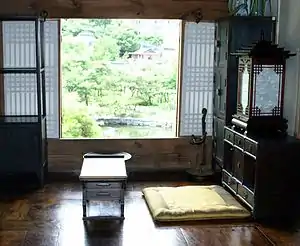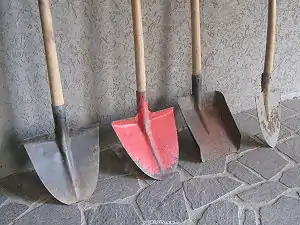< Korean < Words


| |
사랑

Korean salon, ie, 사랑방
- 집의 안채와 떨어져 있는, 바깥주인이 거처하며 손님을 접대하는 곳. [4]
- salon, hall ("meeting room"), guestroom, guesthouse.
- Compounds
- 사랑방 (sarang-bang, "guest room")
- 사랑채 (sarang-chae, "guest house")
- Comparatives
- wikt: salon
- wikt: sale #Etymology_1 "hall"
- Adapted from "meeting room" of wikt: hall #Translations
|
- wikt: Uppsala, literally, "upper dwelling"
- See also
- 살다 (sal-da) to live, reside, dwell
사마
- Roman: sama
- Hanja: 司馬
- Noun
- Comparatives
|
- See also
- 말 (mal, "horse")
Korean/Words/사이ㅅ
Korean/Words/살
Korean/Words/살다
Korean/Words/살롱
Korean/Words/삼
삽

Various shovels.
- Roman: sab
- Older: 삷 (salb)
- Noun
- 땅을 파고 흙을 뜨는 데 쓰는 연장. [7]
- shovel, ie., a hand tool with a handle, used for moving portions of material such as earth, snow, and grain from one place to another, with some forms also used for digging. Not to be confused with a spade, which is designed solely for small-scale digging and incidental tasks such as chopping of small roots. [8]
- Relatives
- 鍤 (삽, sap, "shovel, spade")
- 揷 (삽, sap, “to insert; to stick into; to plant; etc.”)
- 가래 (garae, "share, ploughshare")
- 호미 (homi, "hoe")
- Comparatives
|
Korean/Words/서리
Korean/Words/서울
설
- RR: seol
설1
- RR: seol [ 설ː ] [11]
- (lunar or solar) new year's day
- (obsolete) years of age
- Synonyms
- → 설날 (seolnal) [12]
- → 살 (sal)
- Comparatives
- 춘절 (春節, chunjeol, "Chinese New Year") [13]
- voorjaar #Dutch ("spring," literally, "fore of year")
- vor #German ("ahead of" cf. English "fore" Dutch "voor")
- vor #Icelandic ("spring season")
- jaro #Czech ("spring season") [14]
- year #English ("year") [15]
- Yule #English ("Yule") [16]
- Associatives
- sol #Latin ("sun") & sol #Descendants
세
- RR: se
세1
- RR: se [17]
- (numeral) three
- Associatives
- See also
- Korean/Words/네 (ne, "four")
세다
- Roman: se-da
- Adjective
- Compounds
- Relatives
- 세 #Etymology 1 Conjugation (se) [25]
- 세 (勢, se, "power, force")
- 水勢 #Chinese #Japanese (Korean: 수세, suse) lit. "water power"
- 쇠 (soe, "iron, metal")
- Comparatives
|
- See also
- 바다 (bada, "sea")
Korean/Words/소리
Korean/Words/솔
Korean/Words/술
Korean/Words/숨
Korean/Words/숯
Korean/Words/스미다
Korean/Words/시옷
Korean/Words/시울
Korean/Words/실
Korean/Words/십일조
- ↑ This Sino-Korean word may not be used elsewhere than in Korea.
- ↑ https://ko.dict.naver.com/#/search?query=사랑
- ↑ https://en.wiktionary.org/wiki/사랑
- ↑ Away from the main, this is a special residence where the host used to stay and meet guests.
- ↑ 뉴에이스 국어사전
- ↑ (máršal)
- ↑ https://ko.dict.naver.com/#/search?query=삽
- ↑ https://en.wiktionary.org/wiki/삽
- ↑
- ↑ shovel = shove + -el (instrumental/agent suffix).
- ↑
- =설날.
- 음력설과 양력설을 통틀어 이르는 말.
- Korean New Year (same as Chinese New Year)
- Criticism
- To let it be "Korean New Year" is to play it down, one may fear.
- ↑ Busy Koreans could do without so many artificial Sino-Korean synonyms such as:
- 세수 (歲首)
- 세시 (歲始)
- 세초 (歲初)
- 연두 (年頭)
- 연수 (年首)
- 연시 (年始)
- 원단 (元旦)
- 원신 (元新)
- 원일 (元日)
- 원정 (元正)
- 원조 (元朝)
- 정조 (正朝)
- 정초 (正初), etc.
- ↑
- =봄철(계절이 봄인 때).
- the spring season, the springtime
- Chinese New Year, Spring Festival
- ↑ "from Proto-Indo-European *yōro-, *yeh₁ro- (“year, spring”)"
- ↑ "from Old English ġēr, ġēar (“year”), from Proto-Germanic *jērą (“year”), from Proto-Indo-European *yōro-, *yeh₁ro- (“year, spring”)"
- ↑ "from Old English ġeōl, ġeola (“midwinter”)"
- ↑
- 그 수량이 셋임을 나타내는 말.
- three
- ↑
- Etymology
- The Persian word سهتار setâr is a combination of سه se—meaning "three"—and تار târ—meaning "string", therefore the word gives the meaning of "three-stringed" or "tri-stringed".
- ↑ sea (n.)
[...] of unknown origin, outside connections "wholly doubtful" [Buck]. - ↑ La Rocco Tower with La Corbière lighthouse in the background.
- ↑ https://ko.dict.naver.com/#/search?query=세다
- ↑ https://en.wiktionary.org/wiki/세다
- ↑ 사물의 기세 따위가 몹시 거칠고 세차다. 성격 따위가 거칠고 억세다.
- ↑ 힘차고 튼튼하다. 뜻한 바를 굽히지 않고 밀고 나아가는 힘이 있다.
- ↑ This is not only the stem of the adjective 세다 at hand, but also its indicative & interrogative, non-past, informal non-polite, sentence-final form, as it were!
- ↑ IPA: /siː/
- ↑ IPA: /sɛː/, /seː/
This article is issued from Wikiversity. The text is licensed under Creative Commons - Attribution - Sharealike. Additional terms may apply for the media files.

